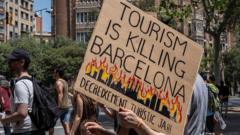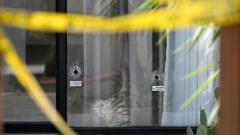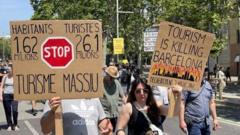**Pahalgam, once a buzzing tourist hub, faces uncertainty as it grapples with the aftermath of violence while attempting to revive its tourism economy.**
**Kashmir's Pahalgam: A Fragile Return to Tourism After Tragedy**

**Kashmir's Pahalgam: A Fragile Return to Tourism After Tragedy**
**Tourists cautiously return to Pahalgam following a deadly militant attack, but lingering fears disrupt the recovery.**
One week after a tragic militant attack near Pahalgam, Kashmir, which claimed 26 lives and left the town grappling with fear and uncertainty, a cautious trickle of tourists is beginning to return. This picturesque town, often referred to as the "Switzerland of India," presents an eerie calm, with lingering signs of the devastation evident on its now partially filled streets.
The assault occurred last Tuesday when militants targeted visitors near Baisaran, a favored meadow just three miles from Pahalgam. The attack sent shockwaves throughout India, leading to increased tensions between India and Pakistan, both of which stake claim to the region. The rising tensions have prompted speculation about possible military responses from the Indian government, further complicating the already dire security situation.
In response to the attack, authorities have shuttered over half of the tourist spots in the valley for security assessments and operations. The impact on local businesses, heavily reliant on tourism, has been severe, leaving shopkeepers, like shawl-seller Rafi Ahmed, worried about an uncertain future. Many tourists remained in Pahalgam despite fears, citing the high prices of flights as their reason for staying. Some, like Mumbai tourist Akshay Solanki, recounted feelings of panic during the incident but decided to continue with their travel plans.
Local business owners and community members are advocating for tourists to return, with Bollywood actor Atul Kulkarni stressing the need to show solidarity against the militants. He urged travelers not to cancel their bookings but, instead, to visit Pahalgam in larger numbers. However, the road to recovery may be slow, with many businesses facing a sharp rise in cancellation rates since the tragedy. Reports indicate that cancellations from major cities could reach as high as 90%.
The ongoing violence impacts more than just immediate tourism; the planned inauguration of the world’s highest single-arch rail bridge is now delayed, and long-term investments in the region may dwindle as potential investors reevaluate their plans. Local leaders, including Jammu and Kashmir's Chief Minister Omar Abdullah, have expressed deep sorrow over the attack, recognizing the heavy blow dealt to the region’s reputation and economy. With the tourism sector's survival in jeopardy, hope hangs on the fragile resilience of the townspeople and their ability to restore a sense of safety to potential visitors.
The assault occurred last Tuesday when militants targeted visitors near Baisaran, a favored meadow just three miles from Pahalgam. The attack sent shockwaves throughout India, leading to increased tensions between India and Pakistan, both of which stake claim to the region. The rising tensions have prompted speculation about possible military responses from the Indian government, further complicating the already dire security situation.
In response to the attack, authorities have shuttered over half of the tourist spots in the valley for security assessments and operations. The impact on local businesses, heavily reliant on tourism, has been severe, leaving shopkeepers, like shawl-seller Rafi Ahmed, worried about an uncertain future. Many tourists remained in Pahalgam despite fears, citing the high prices of flights as their reason for staying. Some, like Mumbai tourist Akshay Solanki, recounted feelings of panic during the incident but decided to continue with their travel plans.
Local business owners and community members are advocating for tourists to return, with Bollywood actor Atul Kulkarni stressing the need to show solidarity against the militants. He urged travelers not to cancel their bookings but, instead, to visit Pahalgam in larger numbers. However, the road to recovery may be slow, with many businesses facing a sharp rise in cancellation rates since the tragedy. Reports indicate that cancellations from major cities could reach as high as 90%.
The ongoing violence impacts more than just immediate tourism; the planned inauguration of the world’s highest single-arch rail bridge is now delayed, and long-term investments in the region may dwindle as potential investors reevaluate their plans. Local leaders, including Jammu and Kashmir's Chief Minister Omar Abdullah, have expressed deep sorrow over the attack, recognizing the heavy blow dealt to the region’s reputation and economy. With the tourism sector's survival in jeopardy, hope hangs on the fragile resilience of the townspeople and their ability to restore a sense of safety to potential visitors.






















